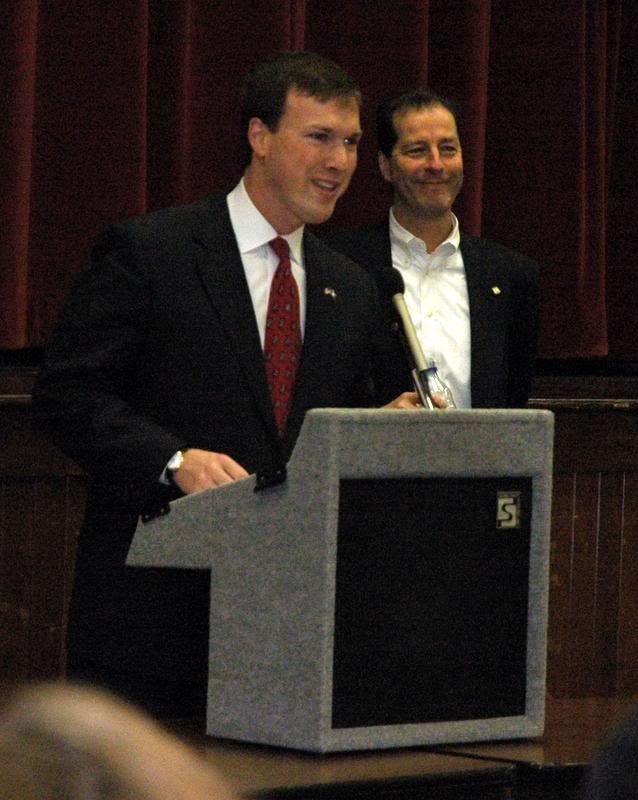 Two days after his reconfirmation as Secretary of Transportation, Pierce Homer came to Vienna, appearing with Delegate Steve Shannon in a community forum on state policy issues. Homer, who left the Governor-elect?s weekend cabinet retreat to participate in this meeting, briefed the group on the difficult task the Department of Transportation encountered in the previous administration, bringing the system into a point of fiscal health. At the start of the Warner administration, the system was more than $860,000,000 over budget, with a peculiar system of deficit financing in place: when a project exceeded its budget, specific funds could be removed from other planned projects. Transportation projects tended to run exceedingly over time, over budget at the start of the past administration. Virginia?s abysmal management performance brought concern from federal authorities and private sector financiers alike.
Two days after his reconfirmation as Secretary of Transportation, Pierce Homer came to Vienna, appearing with Delegate Steve Shannon in a community forum on state policy issues. Homer, who left the Governor-elect?s weekend cabinet retreat to participate in this meeting, briefed the group on the difficult task the Department of Transportation encountered in the previous administration, bringing the system into a point of fiscal health. At the start of the Warner administration, the system was more than $860,000,000 over budget, with a peculiar system of deficit financing in place: when a project exceeded its budget, specific funds could be removed from other planned projects. Transportation projects tended to run exceedingly over time, over budget at the start of the past administration. Virginia?s abysmal management performance brought concern from federal authorities and private sector financiers alike.Today, the situation is remarkably different. Virginia?s transportation projects carry no deficits. The state?s on time/on budget rate is highest in the nation, bringing in the token award of forfeited funds from states with poor project management.
However, for Homer, this has meant attending only four ribbon cuttings in the course of his service. Excellent management has meant tough decisions?and he said that one of the harder parts of his job has been making clear the reason why the state has had to focus only on the projects with the largest impact.
Homer stated that the next priority project will be extending the Metrorail through Tyson?s and possibly as far as Loudoun County. Accomplishing this will involve complex mediation between the Dulles Toll Road/Access Road, landowners, and state management authorities, as well as the interests of citizen stakeholders. When asked why not to install a bus-rapid transit system, Homer indicated that the option had been deeply considered, that getting sufficient rapidity in the system to make it worthwhile to commuters would involve construction of a raised roadway?which would cost as much as rail, but with less impact.
Secretary Homer concluded that at the end of the day, for most folks what matters aren?t the big high profile projects, but the little things?like whether traffic blocks access from a side street. In recognizing Delegate Shannon?s tireless efforts to get pavement surveys, he indicated that the core of the plan for any transportation projects is preserving the integrity of communities in Virginia. Ultimately, however, a big factor will be how decisions made in other counties and municipalities impact local transportation issues. This issue, ties back to Kaine?s concern that transportation decisions connect back to development choices.
After Homer responded to local questions, Delegate Shannon took over, providing a preview to constituents of the upcoming legislative session.